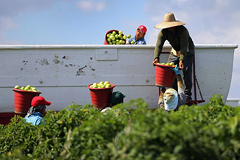Texas importers see rotten tomatoes in claims of Mexican dumping
22/03/2019 12:00

The Trump administration is threatening to pull out of a trade deal with Mexico, a move that could increase what U.S. grocery shoppers pay for tomatoes and hurt Texas and Arizona produce importers.
The U.S. Department of Commerce is looking to end a 23-year succession of agreements that set price floors and prevent tariffs on Mexican tomatoes. Despite the deals, administration officials say, Mexican growers have continued to undercut their U.S. competitors.
If U.S. and Mexican officials don’t agree to a new pact before the most recent agreement ends May 7, the U.S. will conduct an anti-dumping investigation. In the meantime, importers will be required to pay deposits estimated at 17.5 percent of the price of their Mexican tomato imports.
That could be a big blow to the $3 billion industry that’s grown up around importing Mexican tomatoes.
“Just the three bridges alone in Pharr, Laredoand Progreso imported almost $1 billion worth of tomatoes in 2017,” said Dante Galeazzi, CEO of the Texas International Produce Association. “When you start looking at the number of companies that are touching tomatoes here in the United States and specifically in Texas — you’ve got the importers, you’ve got the guys that are repacking, you have the final sales — all those people have employees that are depending on the Mexican tomato business.”
“Margins in fresh produce are already razor thin,” he said, “so if there’s increases, that increase just gets passed down the supply line to the final consumer.”
Nogales, Ariz.-based Fresh Produce Association of the Americas says even a 5 percent reduction in Mexican tomatoes would cost U.S. consumers an additional 25 cents per pound, or $790 million a year.
Florida and other U.S. tomato growers, who accuse Mexico of unfairly subsidizing the country’s producers, say they are fighting to preserve a vital domestic industry.
“There is rampant circumvention of the agreement. There are loopholes in the agreement. There’s a lack of enforcement. And the domestic industry continues to decline as a result,” said Michael Schadler, executive vice president of the Florida Tomato Exchange, which represents growers.
Commerce Secretary Wilbur Ross' plan to withdraw from the tomato suspension agreement — called that because the agreements suspended anti-dumping investigations against Mexico — followed a Feb.1 letter from Florida U.S. Sen. Marco Rubio and 47 House and Senate colleagues.
Since 1996, Mexico’s share of the U.S. tomato market increased to 54 percent from 32 percent, the letter said, while U.S. growers’ slice dropped to 40 percent from 65 percent. U.S. production of tomatoes has declined 34 percent since 2002, and Mexican tomatoes have skyrocketed 125 percent.
“Mexican tomato exporters have used successive suspension agreements as cover for their continued use of unfair trade practices to gain U.S. market share at the expense of the domestic tomato industry,” the lawmakers wrote.
The Border Trade Alliance fired back with its own letter to Ross, saying he was responding to regional and politically powerful interests at the expense of U.S. consumers and international trade.
The letter cited a recent study that showed tomato imports alone support more than 30,000 U.S. jobs and a supply chain that generates nearly $3 billion in gross domestic product. Signatories included the city of McAllen, Rio Grande Valley Partnership and Laredo-based International Bank of Commerce.
Mexico is the United States’ top agricultural trade partner, they said, annually importing about $18 billion worth of U.S. products that make up about 70 percent of Mexico’s agri-food imports.
“Our concern is you’re going to create sectorial or even regional trade by taking these kinds of measures,” IBC Bank Executive Vice President Gerald Schwebel said. “Who’s going to be next? ... This thing can be a never-ending process.”
Importers say the administration’s plan is backed by some of the same interests who wanted to insert so-called seasonality provisions into the pending United States-Mexico-Canada trade agreement. The failed effort would have allowed smaller, regional U.S. produce groups to seek trade protection during seasons when competition is most intense.
“It’s the same group,” Lance Jungmeyer, president of the Fresh Produce Association of the Americas, said.
“At the end of the day with seasonality (provisions), we would have a patchwork quilt of tariffs all around the country at different times,” Jungmeyer said. “And you would end up with foreign countries saying, ‘Hmm, I guess I can do that, too.’ And you would see the level of trade go backward.”
Schadler of the Florida Tomato Exchange, however, rejects the notion that growers who want fair competition with their Mexicans counterparts are seeking a protectionist advantage.
“This is not some kind of unilateral act by U.S. tomato growers to block the market for Mexico,” he added. “It is a consequence of unfair trade practices by the Mexicans.”
Other agri-business interests say U.S. growers have fallen behind Mexican producers because they’ve failed to invest enough in technology and process improvements.
“To me, the industry in the United States has had 25 years to change its technology to be able to meet consumer demand and they have not made barely a move to do anything,” said Bryant Ambelang, CEO of San Antonio-based NatureSweet, which grows greenhouse tomatoes in both Mexico and Arizona. “We believe we’ve actually in the last five years invested more in protected or high-tech agriculture to be able to service the consumer than the people who are in favor of continued tariffs on tomatoes from Mexico.”
The U.S. Department of Commerce is looking to end a 23-year succession of agreements that set price floors and prevent tariffs on Mexican tomatoes. Despite the deals, administration officials say, Mexican growers have continued to undercut their U.S. competitors.
If U.S. and Mexican officials don’t agree to a new pact before the most recent agreement ends May 7, the U.S. will conduct an anti-dumping investigation. In the meantime, importers will be required to pay deposits estimated at 17.5 percent of the price of their Mexican tomato imports.
That could be a big blow to the $3 billion industry that’s grown up around importing Mexican tomatoes.
“Just the three bridges alone in Pharr, Laredoand Progreso imported almost $1 billion worth of tomatoes in 2017,” said Dante Galeazzi, CEO of the Texas International Produce Association. “When you start looking at the number of companies that are touching tomatoes here in the United States and specifically in Texas — you’ve got the importers, you’ve got the guys that are repacking, you have the final sales — all those people have employees that are depending on the Mexican tomato business.”
“Margins in fresh produce are already razor thin,” he said, “so if there’s increases, that increase just gets passed down the supply line to the final consumer.”
Nogales, Ariz.-based Fresh Produce Association of the Americas says even a 5 percent reduction in Mexican tomatoes would cost U.S. consumers an additional 25 cents per pound, or $790 million a year.
Florida and other U.S. tomato growers, who accuse Mexico of unfairly subsidizing the country’s producers, say they are fighting to preserve a vital domestic industry.
“There is rampant circumvention of the agreement. There are loopholes in the agreement. There’s a lack of enforcement. And the domestic industry continues to decline as a result,” said Michael Schadler, executive vice president of the Florida Tomato Exchange, which represents growers.
Commerce Secretary Wilbur Ross' plan to withdraw from the tomato suspension agreement — called that because the agreements suspended anti-dumping investigations against Mexico — followed a Feb.1 letter from Florida U.S. Sen. Marco Rubio and 47 House and Senate colleagues.
Since 1996, Mexico’s share of the U.S. tomato market increased to 54 percent from 32 percent, the letter said, while U.S. growers’ slice dropped to 40 percent from 65 percent. U.S. production of tomatoes has declined 34 percent since 2002, and Mexican tomatoes have skyrocketed 125 percent.
“Mexican tomato exporters have used successive suspension agreements as cover for their continued use of unfair trade practices to gain U.S. market share at the expense of the domestic tomato industry,” the lawmakers wrote.
The Border Trade Alliance fired back with its own letter to Ross, saying he was responding to regional and politically powerful interests at the expense of U.S. consumers and international trade.
The letter cited a recent study that showed tomato imports alone support more than 30,000 U.S. jobs and a supply chain that generates nearly $3 billion in gross domestic product. Signatories included the city of McAllen, Rio Grande Valley Partnership and Laredo-based International Bank of Commerce.
Mexico is the United States’ top agricultural trade partner, they said, annually importing about $18 billion worth of U.S. products that make up about 70 percent of Mexico’s agri-food imports.
“Our concern is you’re going to create sectorial or even regional trade by taking these kinds of measures,” IBC Bank Executive Vice President Gerald Schwebel said. “Who’s going to be next? ... This thing can be a never-ending process.”
Importers say the administration’s plan is backed by some of the same interests who wanted to insert so-called seasonality provisions into the pending United States-Mexico-Canada trade agreement. The failed effort would have allowed smaller, regional U.S. produce groups to seek trade protection during seasons when competition is most intense.
“It’s the same group,” Lance Jungmeyer, president of the Fresh Produce Association of the Americas, said.
“At the end of the day with seasonality (provisions), we would have a patchwork quilt of tariffs all around the country at different times,” Jungmeyer said. “And you would end up with foreign countries saying, ‘Hmm, I guess I can do that, too.’ And you would see the level of trade go backward.”
Schadler of the Florida Tomato Exchange, however, rejects the notion that growers who want fair competition with their Mexicans counterparts are seeking a protectionist advantage.
“This is not some kind of unilateral act by U.S. tomato growers to block the market for Mexico,” he added. “It is a consequence of unfair trade practices by the Mexicans.”
Other agri-business interests say U.S. growers have fallen behind Mexican producers because they’ve failed to invest enough in technology and process improvements.
“To me, the industry in the United States has had 25 years to change its technology to be able to meet consumer demand and they have not made barely a move to do anything,” said Bryant Ambelang, CEO of San Antonio-based NatureSweet, which grows greenhouse tomatoes in both Mexico and Arizona. “We believe we’ve actually in the last five years invested more in protected or high-tech agriculture to be able to service the consumer than the people who are in favor of continued tariffs on tomatoes from Mexico.”
March 20, 2019
Source: San Antonio Express News
Source: San Antonio Express News
Các tin khác
- Find opportunities in niche markets to increase exports (15/04/2024)
- US extends conclusion on tax evasion probe into Vietnamese wooden cabinets (15/04/2024)
- Italy remains Vietnam's largest iron and steel import market (15/04/2024)
- Does the EU have what it takes to fight China on green tech? (15/04/2024)
- Not enough evidence to investigate Chinese HRC: businesses (15/04/2024)
 Home
Home
 About Us
About Us




















